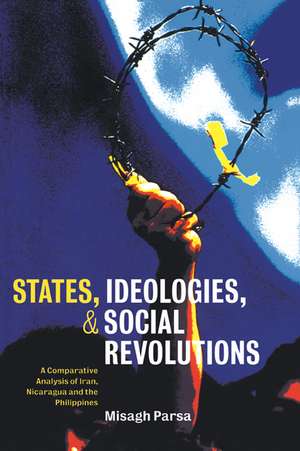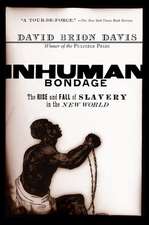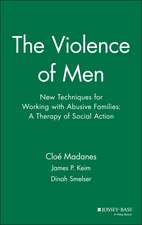States, Ideologies, and Social Revolutions: A Comparative Analysis of Iran, Nicaragua, and the Philippines
Autor Misagh Parsaen Limba Engleză Paperback – 16 aug 2000
| Toate formatele și edițiile | Preț | Express |
|---|---|---|
| Paperback (1) | 289.57 lei 6-8 săpt. | |
| Cambridge University Press – 16 aug 2000 | 289.57 lei 6-8 săpt. | |
| Hardback (1) | 723.50 lei 6-8 săpt. | |
| Cambridge University Press – 6 aug 2000 | 723.50 lei 6-8 săpt. |
Preț: 289.57 lei
Nou
Puncte Express: 434
Preț estimativ în valută:
55.41€ • 58.06$ • 45.81£
55.41€ • 58.06$ • 45.81£
Carte tipărită la comandă
Livrare economică 11-25 aprilie
Preluare comenzi: 021 569.72.76
Specificații
ISBN-13: 9780521774307
ISBN-10: 0521774306
Pagini: 340
Ilustrații: 10 tables
Dimensiuni: 153 x 228 x 23 mm
Greutate: 0.49 kg
Ediția:New.
Editura: Cambridge University Press
Colecția Cambridge University Press
Locul publicării:Cambridge, United Kingdom
ISBN-10: 0521774306
Pagini: 340
Ilustrații: 10 tables
Dimensiuni: 153 x 228 x 23 mm
Greutate: 0.49 kg
Ediția:New.
Editura: Cambridge University Press
Colecția Cambridge University Press
Locul publicării:Cambridge, United Kingdom
Cuprins
List of tables; Preface; Part I. Theory and Structural Background: 1. Toward a theory of revolution: linking structure and process approaches; 2. Conflict and the making of exclusive rule; 3. State intervention and contradictions; Part II. Mobilization and Collective Action: Prelude; 4. Students: relentless revolutionaries; 5. Clergy: actors with relative impunity; 6. Workers: rebels with dual targets; 7. Capitalists: reluctant rebels; Part III. Outcomes and Conclusions: 8. Coalitions, challengers, and political outcomes; 9. Summary and conclusions; Bibliography; Index.
Recenzii
'In this ambitious book, sociologist [Misagh] Parsa of Dartmouth College compares and contrasts the revolutions in Iran, Nicaragua, and the Philippines in a framework that draws on structural, resource mobilization, and political process theories. Highly recommended for scholars and upper-division undergraduate and graduate students in the fields of comparative social movements.' N. Entessar, Choice
'Parsa offers a fine combination of careful, nuanced empirical case studies and theoretical propositions regarding key factors omitted from structural theories of revolution. Along with other recent work influenced by the 'new institutionalism', this volume points the way toward a new and richer synthesis of structure and agency in our understanding of revolutions and revolutionary processes.' Jack A. Goldstone, American Political Science Review
'Make room on your bookshelf next to Skocpol, Tilly, and Goldstone. Mirasha Parsa's new book is a major contribution to the comparative and historical study of revolutions. Along with works of Paige and Wickham-Crowley, this book ranks among the very best analyses of revolutions in developing or Third World societies.' Jeff Goodwin, American Journal of Sociology
'A well-researched work of general interest.' U.S.I. Journal
'Parsa offers a fine combination of careful, nuanced empirical case studies and theoretical propositions regarding key factors omitted from structural theories of revolution. Along with other recent work influenced by the 'new institutionalism', this volume points the way toward a new and richer synthesis of structure and agency in our understanding of revolutions and revolutionary processes.' Jack A. Goldstone, American Political Science Review
'Make room on your bookshelf next to Skocpol, Tilly, and Goldstone. Mirasha Parsa's new book is a major contribution to the comparative and historical study of revolutions. Along with works of Paige and Wickham-Crowley, this book ranks among the very best analyses of revolutions in developing or Third World societies.' Jeff Goodwin, American Journal of Sociology
'A well-researched work of general interest.' U.S.I. Journal
Descriere
An analysis of the causes and processes of revolution, drawing on the stories of Iran, Nicaragua, and the Philippines.












